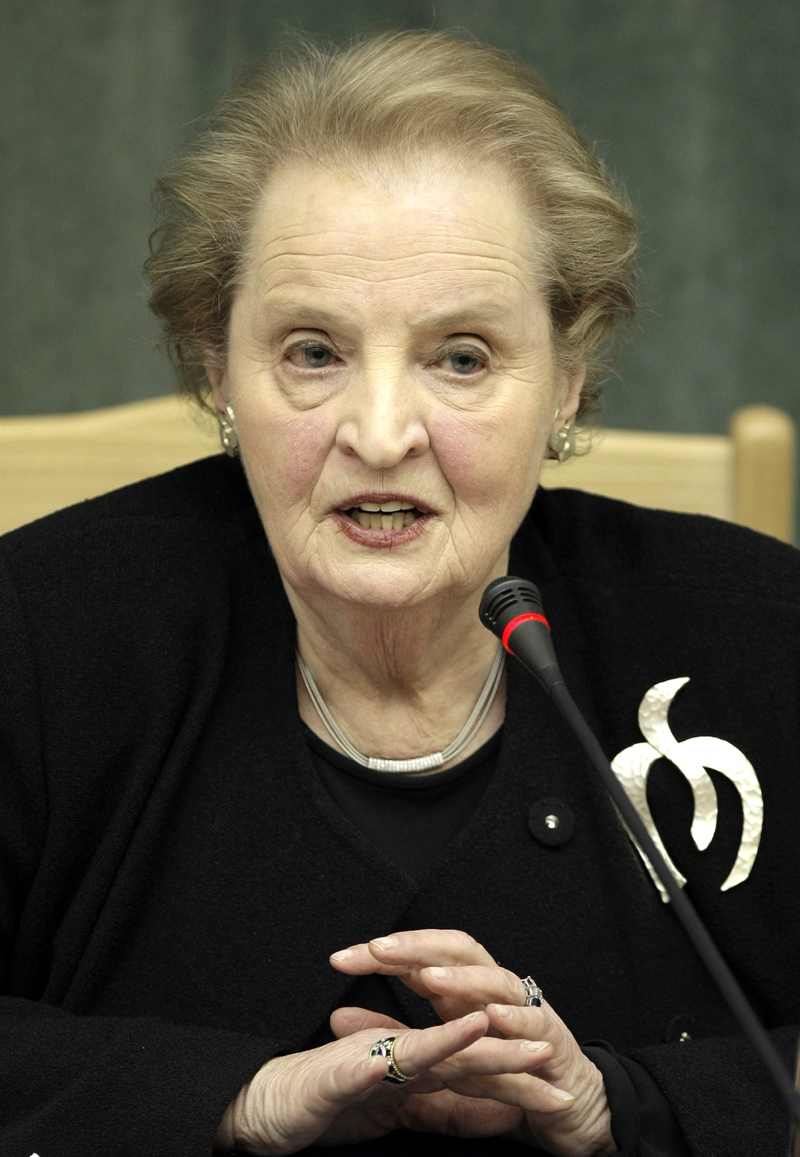
Editor’s Note: In an interview with Enough Project Co-founder John Prendergast, former U.S. Secretary of State Madeleine Albright, who currently serves as a professor of international relations at Georgetown University, describes her Enough Moment and what sustains her work on human rights issues.
JOHN: When was your first Enough Moment?
DR. ALBRIGHT: Well, let me just take a little step back. As you know, I was born in Czechoslovakia. So all through the Cold War period, I watched what the various dissidents were doing, and I wrote my dissertation on the period of relative openness that occurred in 1968 and that became known as Prague Spring. I cared deeply about human rights and democracy in Central and Eastern Europe and in Russia, but I was just a professor and an ordinary citizen, so all I could really do was talk, teach, and write. Then, in 1993, as part of the Clinton administration, I was given the chance to serve as America’s permanent representative to the United Nations.
It so happens that my Enough Moment really came just before that. I certainly knew about genocide, given what had happened in Europe when major powers like Great Britain, France, and the United States didn’t act early enough to prevent it. So I was shocked when, in 1991 and 1992, we began seeing pictures of Bosnians and Croats being put on trains and shipped to concentration camps, and pictures of whole families being driven from homes in which their families had lived for centuries. I thought, I can’t believe it. These looked like pictures we had seen in history books of World War II. I remember seeing those pictures and thinking that this was impossible to accept.
When I became U.S. ambassador to the United Nations, Bosnia was at the top of our agenda, along with Iraq. During that period one of the UN votes I’m most proud of established the War Crimes Tribunal for former Yugoslavia. But I’m also proud that I was able, along with others, to persuade the administration to eventually stand up to what was happening, persuade NATO to act, and bring the war to an end. I’d had my Enough Moment, and I was fortunate to be in a position to do something about it.
JOHN: What sustains you? What’s the cocktail inside that motivates you?
DR. ALBRIGHT: First of all, I saw in Bosnia and later on in the halting of the ethnic cleansing in Kosovo that if you properly marshal your arguments and figure out how to move the process, you can make an enormous difference. People ask me, “What are you proudest of as secretary of state?” It really was ending the terror in Kosovo. I had seen how long Bosnia had taken, and I thought, “Now I’m secretary of state, and I can’t let this happen again in Kosovo.” Looking back, both Bosnia and Kosovo provide interesting case studies of how to mobilize the U.S. government, NATO, and the world community to implement a humanitarian intervention.
The other thing that has really made me understand the need to keep a light shining on human rights problems, and on freedom and democracy, has been my conversations with Nobel Peace Prize winner Vaclav Havel. This matters because those of us who are on the outside often wonder whether our criticisms on human rights abuses help or hurt democratic leaders such as Burma’s Aung San Suu Kyi or the people of Darfur. If we keep talking about these issues, does that actually make life worse for the people who are at risk? Havel said to me, “The thing that’s most important is you have to keep talking about these issues. It helps us if the light is shining on us.” That’s a very important message.
JOHN: With all the students you have, how do you get and keep young people interested in genocide and human rights? What are the most effective ways of widening the scope of the population that’s willing to get involved?
DR. ALBRIGHT: I have found students these days to be very interested and involved. After 9/11, there was more and more of a sense that we were not an isolated nation that could just sit here and not be involved with what was happening abroad. I have had quite a number of students in my classes who see Darfur as a clear example of where the “Never Again” philosophy should be applied.
JOHN: The Enough Moment.
DR. ALBRIGHT: Yes. The Darfur movement began with students who really felt that they could make a difference. I think that the more we help students to understand that, there but for the grace of God, this could be happening to them, the more they will identify with the people who are in danger. I was born in Czechoslovakia at the time it was being threatened by the Nazis. When British Prime Minister Chamberlain came back from Munich and said, “Why would we want to help people in a far- away country with an unpronounceable name?” one of the people he was talking about was me. My parents taught me to believe that every individual counts— and my experience has taught me that we have a stake, a national interest, in what’s happening in other countries.
This is an abbreviated excerpt of Madeleine Albright’s Enough Moment. The full version is published in The Enough Moment, a book by John Prendergast and Don Cheadle about engaged citizens – known and unknown, in the U.S. and abroad – who are mobilizing to help end genocide, rape, and the use of child soldiers in Africa. Visit the Enough Moment Wall to hear people describe their “Enough moment” and to upload a video, photo, or written testimonial of your own.

